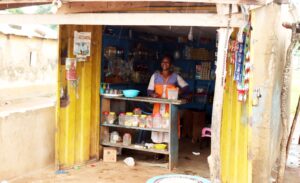Women at the helm of affairs are unseen in most rural communities in Ghana. They are mostly dependent on their husbands to make a living, but the situation is changing gradually in communities where the 4R project is being implemented.
Regina Wumbe, a 32-year-old married woman and a mother of four, is a participant in the 4R Nutrient Stewardship project and is part of the first cohort of women who were trained as Rural Commercial Women (RCW). The program structure is aimed at building the assertiveness of women to articulate agency in entrepreneurial domains and strengthen their capacity for leadership roles at all levels. The project has contributed significantly to developing Regina to be active in all areas of the project. Regina, together with other women belonging to the Rural Commercial Women Groups, has received financial literacy training, livelihood empowerment training, leadership training, and the general principles of the 4R interventions thus, good agronomic practices coupled with the right fertilizer application to improve productivity.

Regina Wumbe, Ghana
“I have joined so many projects in the past, but joining the 4R project has changed my life. I joined the project with my husband and paid attention to all the training details. My capacity has been built, which is helping me with my business. It has also improved my participation in decisions in all areas that may help me develop,” said Regina Wumbe, Chamba community in the Nanumba North district.
Regina shared that she intends to translate her leadership skills into a voice that champions the needs of fellow women. She believes more women need a push in her community, and this she believes, can be achieved if she has a seat at places where the decisions are made in her community. Her thrust for leadership earned her a ticket on the 4R Women Aspirants Concept. This platform is a component of the project that selects women to mentor them to contest the upcoming District Assembly elections/other relevant community roles.
“I can say that. I am entrepreneurial and have great leadership skills because I am a woman sales agent. I am aspiring for the district assembly elections this year, which I am hopeful of winning. Through the training, we are now breaking the norm of women not contesting such positions. I have also received Motor King from the project as a subsidy to aid my business and support other women within the coop,” added Regina.
She is leveraging her learnings from the project to build multiple business streams for herself and her family. During this year’s farming season, she played an intermediary role by mobilizing and facilitating linkages for her peers who required tractor services and inputs.
“This year, as a sales agent, I mobilized tractor service for 48 women and had a commission of GHC320. I make GHC 300 cedis every week from my motor tricycle business transporting people’s goods and farm produce. I have opened a mini shop in my community,” She recounts.
Regina is also an aggregator and provides grains to a senior secondary school in her district. “I am not just a woman now as my society thinks; I am beyond what they perceived about women, and all thanks to the 4R project,” she added.
This intervention is impacting several SDGs in Ghana. Through this project, Regina will increase her income and reduce poverty through her current streams of income. Through the Gender Model Family concept introduced by the 4R project, Regina and some of her colleagues have a voice and are part of the decision-making at the household level. Her attempt to contest for district assembly election will foster gender equality between men and women in the district.
The project recruited 2589 families to showcase positive gender roles among members and community members. The project in year five will recruit new members in addition to previously recruited families. The project has provided first-round training to families as well as monitoring to ensure families are practicing equity and serving as agents to indirect beneficiaries in project communities.